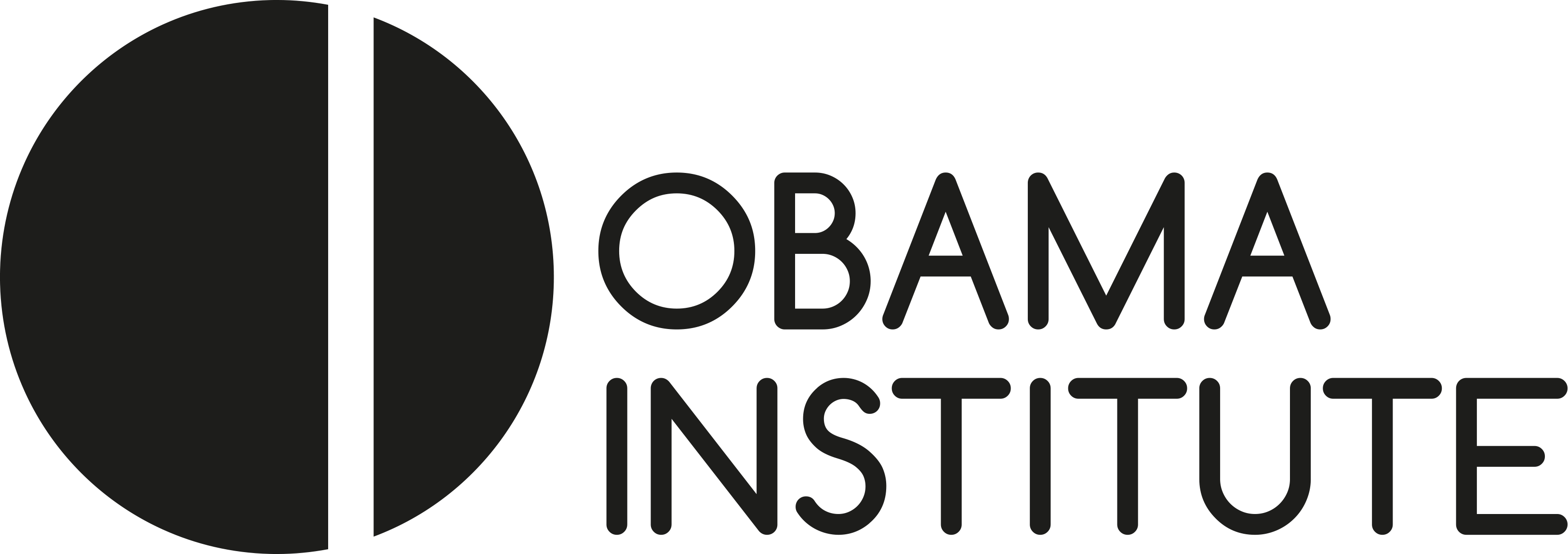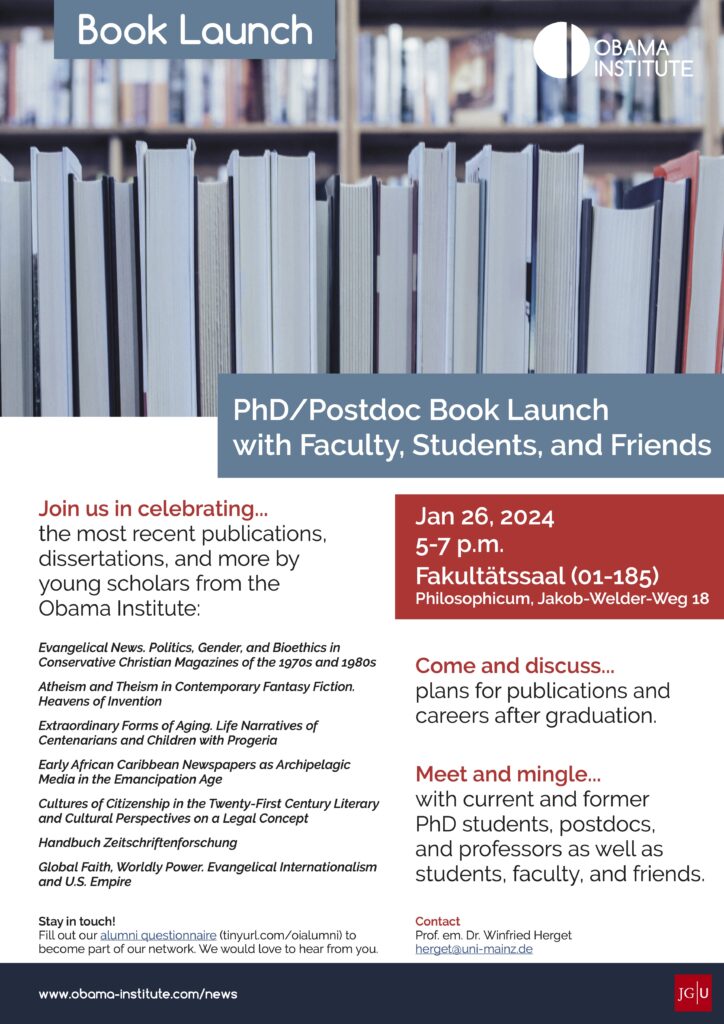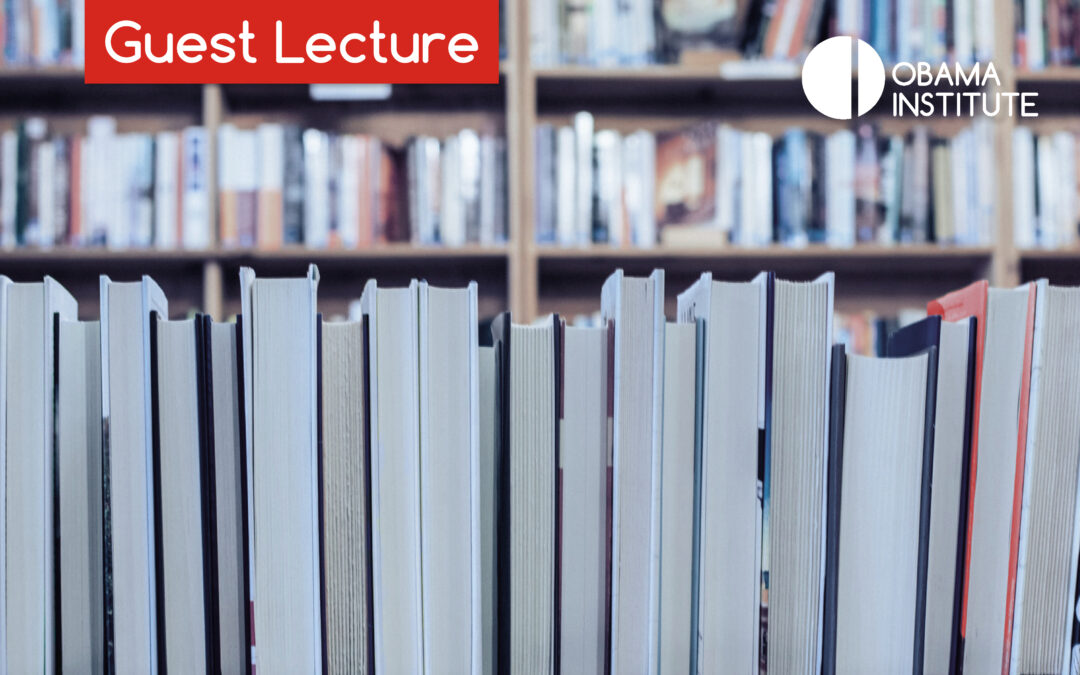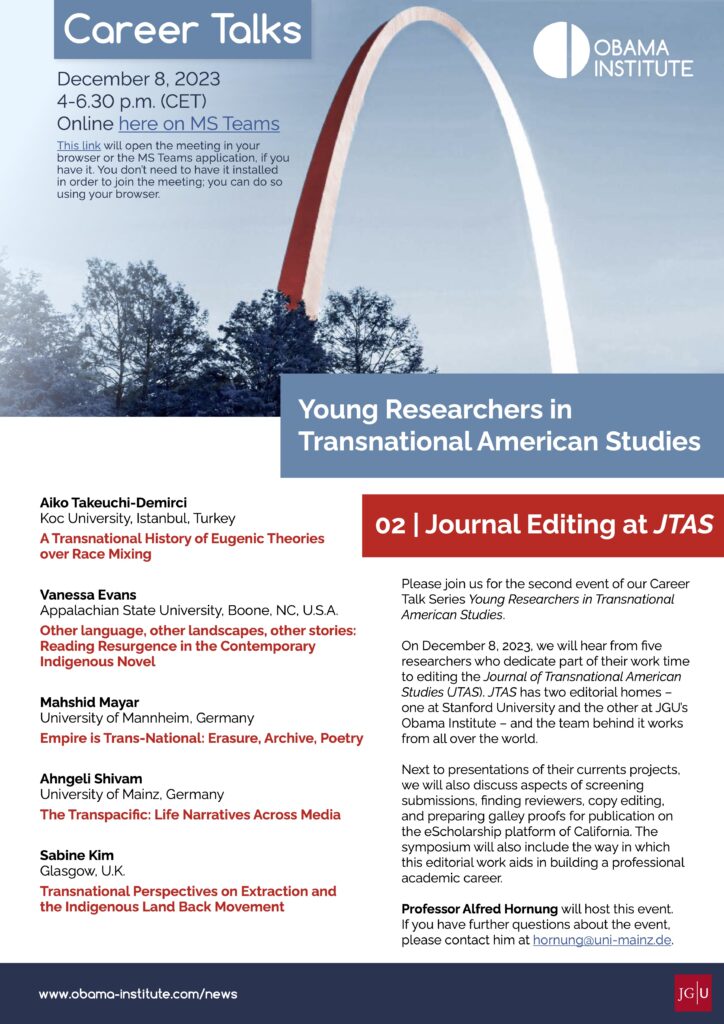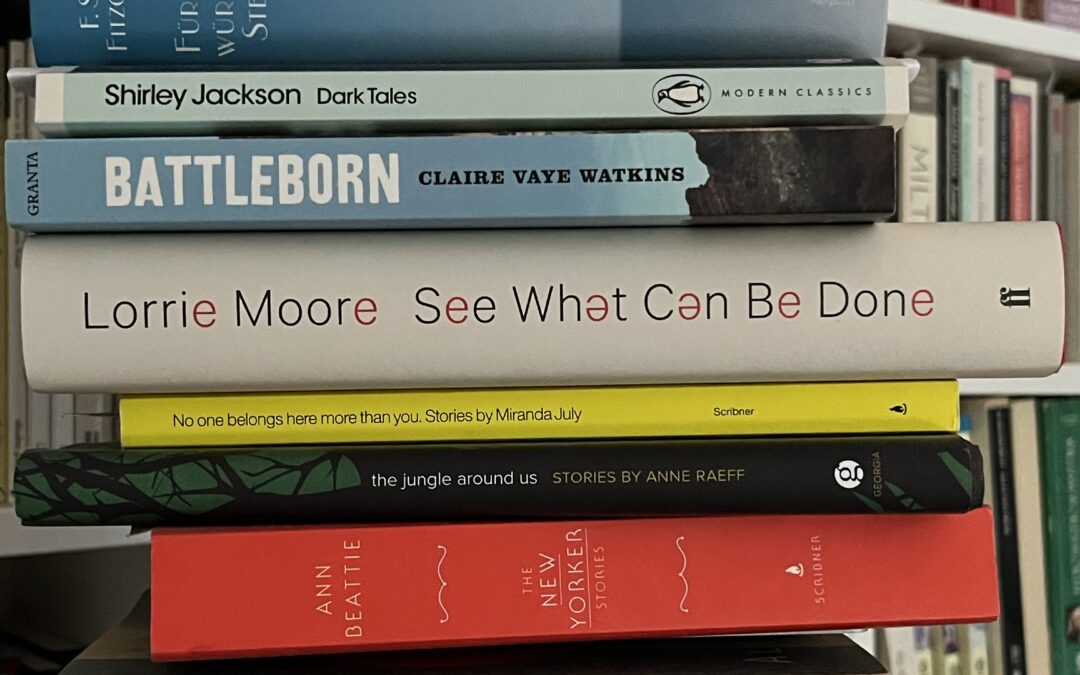
The Persistence of the Short Story: Traditions and Futures 🗓
The Persistence of the Short Story: Traditions and Futures
Date: July 10-12, 2024
Location: Johannes Gutenberg-University Mainz
Hosted by the Obama Institute for Transnational American Studies, the Society for the Study of the American Short Story, and the American Literature Association
Venue: Campus JGU Helmholtz-Institute Mainz (HIM), Staudingerweg 18, 55128 Mainz
Program
Wednesday, July 10, 2024
3:00 pm Registration
4:00 pm Conference Opening (Senatssaal, Natural Science Building (room 07-232))
Vice-President for Research, Johannes Gutenberg-Universität, Prof. Dr. Stefan Müller-Stach
Dean, Faculty of the Humanities, Prof. Dr. Axel R. Schäfer
Director, Obama Institute, Prof. Dr. Alfred Hornung
Conference Organizers, Prof. Dr. Oliver Scheiding, Prof. Dr. Jochen Achilles
4:30 pm Roundtable: Short Fiction Research in a Transnational Context
Chair: Michael Basseler (Justus-Liebig-Universität Giessen): Coordinator Short Forms Beyond Borders-EU Strategic Partnerships
American Literature Association (ALA): Olivia Carr Edenfield, Director (Georgia Southern University), Alfred Bendixen, Executive Director (Princeton University)
Society for the Study of the American Short Story (SSASS): James Nagel, President (University of Georgia)
European Network for Short Fiction Research (ENSFR): Michelle Ryan, Director (Université d’Angers), Ailsa Cox, Associate Director (Edge Hill University), Elke D’hoker, Communications Coordinator (Katholieke Universiteit Leuven)
Studies in the American Short Story: James Nagel, Editor (University of Georgia), Kirk Curnutt, Associate Editor (Troy University)
Journal of the Short Story in English: Gérald Préher, Editor (Université d’Artois)
Short Fiction in Theory and Practice: Ailsa Cox, Principal Editor (Edge Hill University)
6.00 pm Welcome Reception
Thursday, July 11, 2024
Conference Venue: Helmholtz Institute
9:00–10:20 am Session 1: Aesthetic Dimensions
Chair: Jochen Achilles (Julius-Maximilians-Universität Würzburg)
Ailsa Cox (Edge Hill University), “Beyond the Collection”
Elke D’hoker (Katholieke Universiteit Leuven), “Serializing the Short Story”
Michelle Ryan (Université d’Angers), “The Ethics of Short Forms in Rikki Ducornet’s Late Career Writing”
10.20–10:40 am Coffee Break
10:40–12.00 am Session 2: Historical Dimensions
Chair: James Nagel (University of Georgia)
Alfred Bendixen (Princeton University), “New Voices Confronting the Silence – The Emergence of Feminist Traditions in the American Short Story”
Monika Elbert (Montclair State University), “Wealth, Handicaps, and Poverty: Women’s Gothic Tales of Dis-Possession”
Philipp Reisner (Johannes Gutenberg-Universität, Mainz). tba
12:00 am -1:00 pm Lunch
1:00–2:20 pm Session 3: Current Trends
Chair: Laura Dietz (University College London)
Michael Basseler (Justus-Liebig-Universität Giessen), “Is there a Postsocialist North American Short Story?”
Gudrun Grabher (Leopold-Franzens-Universität Innsbruck), “Every Patient has Their Unique Story: The Significance of the Short Story for Medical Humanities”
Patricia MacCormack (Anglia Ruskin University), “Weird Madness: Brief Encounters Against the Anthropocene”
2:30–3:50 pm Session 4: Region
Chair: tba
Alessandra Boller (Universität Siegen), “The Politics of Encounter: B/Order Crossings in Transnational (Irish) Short Fiction”
Olivia Carr Edenfield (Georgia Southern University), “The Poetic Landscape of Breece D’J Pancake”
Gérald Préher (Université d’Artois), “The Past in the Present, or the Enduring South in Elizabeth Spencer’s Starting Over (2014)”
3.50-4:10 pm Coffee Break
4:10–5.30 pm Postgraduate Roundtable on Short Fiction Research
Chair: Alessandra Boller (Universität Siegen)
Maegan Bishop (Georgia Southern University), “Re-imagining the American Landscape: Visual Rhetoric and the Influence of Image on the 21st Century American Short-Story Cycle”
Verónica Frejo (Universidad Autónoma de Madrid), “Short Stories as Videogames: A Transmedia Analysis”
Carolin Jesussek (Johannes Gutenberg-Universität Mainz), “Disability Gothic in William Alexander’s Short Story ‘The House on the Moon’”
Amina Grunewald (Humboldt-Universität zu Berlin), “George Saunders’ Posthumanist agenda in a Nutshell. Cracking Open His Short Fiction”
7:00 pm Mainz City Hall
Reception by the City Authorities
City Hall-Lecture: James Nagel (University of Georgia), “The American Short Story in Academia: A Personal Report”
Friday, July 12, 2024
Conference Venue: Helmholtz Institute Mainz
9:00–10.20 am Session 5: Media and New Approaches
Chair: Oliver Scheiding (Johannes Gutenberg-Universität Mainz)
Kirk Curnutt (Troy University), “Prophecies of Extinction, Prospects for Evolution: Whither the Future of the Short Story?”
Bernardo Manzoni Palmeirim (Universidade de Lisboa), “Paying Attention in Lydia Davis and Short Forms”
Ines Maria Gstrein (University of Innsbruck), “The Affordance of the Short Story Collection. Ali Smith’s Free Love and Other Stories as a Case Study”
10:20–10:40 am Coffee Break
10:40–12:00 am Session 6: Digitization
Chair: Verónica Frejo (Universidad Autónoma de Madrid)
Laura Dietz (University College London), “Digitization and Short Story Authorship: Authorial Careers on Emerging Platforms”
Jana Keck (German Historical Institute Washington), “Fact or Fiction? Computational Analysis of Short Stories in Nineteenth-Century German-American Newspapers”
Damien B. Schlarb (Johannes Gutenberg-Universität Mainz), “Short Stories, Longplay: Formal Influences of the Short Story on Digital Games and the Integration of Narrative and Play”
12:00 am–1:00 pm Lunch
1:00–2:50 pm Session 7: Science Fiction
Chair: Sabina Fazli (Johannes Gutenberg-Universität Mainz)
Andrew M. Butler (Canterbury Christ Church University), “’The Flimsiest of Tissues’: Pamela Zoline’s ‘The Holland of the Mind’”
Gary Westfahl (University of La Verne), “Confronting the Alien in the Science Fiction Short Story”
Lohmann, Sarah (ETH Zürich), “‘Like Children Dying in A Forest:’ The Science Fiction Short Story and the Morality of Machine Cognition in E.M. Forster’s ‘The Machine Stops’ and Ray Bradbury’s ‘August 2026: There Will Come Soft Rains'”
Anne McFarlane (University of Leeds) tba
2:50–3:10 pm Coffee Break
3:10–4:10 pm Session 8: Diversity
Chair: Michelle Ryan (Université d’Angers)
Erik Redling (Martin-Luther-Universität Halle-Wittenberg), “Modernist Politics of Race: Allegorical Readings of Zora Neale Hurston’s Early Short Fiction”
Hertha Dawn Sweet Wong (University of California, Berkeley), “The Future of the Indigenous Short Story”
4:20–5:20 pm Session 9: Horror and Crime
Chair: Olivia Carr Edenfield (Georgia Southern University)
Will Norman (University of Kent), “Paul Linebarger, Cordwainer Smith and the Affordances of Mid-Century Science Fiction Tales”
Whit Frazier Peterson (Universität Stuttgart), “The Sunken and the Ascending: Black Horror Short Fiction”
8.00 pm Conference Dinner at Weingut Philipp Dhom, Jakob Braunwart Weg 3, 55129 Mainz (meet up tba, joint travel to the location; http://winzerfamilie-peter-dhom.de)
Maps (Hotels, Campus, and Venues)
Frankfurt Airport to Mainz (S-Bahn)
Take the train from Frankfurt Airport to Mainz Central Station (tram line: S8). Tickets can be purchased at the airport vending machines (approximately 9,90€). Both hotels are a short walk from the main entrance of the train station.
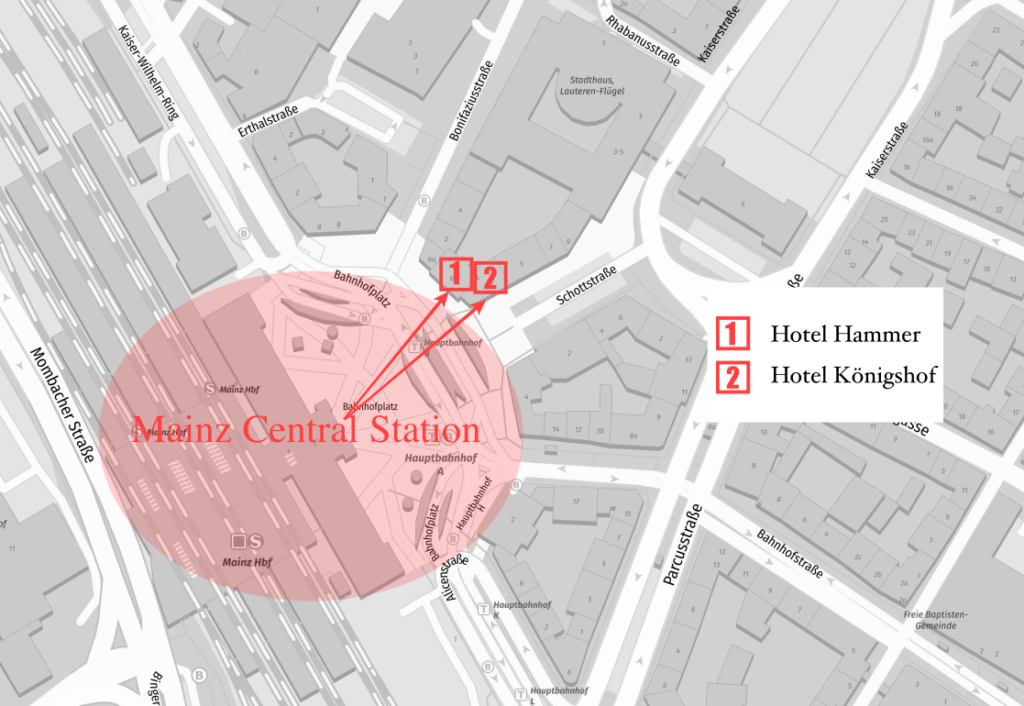
Mainz Station to University (Tram lines 51, 53, and 59)
There are a variety of buses and trams from Mainz Central Station to the JGU campus. We recommend you take the trams (lines 51, 53, or 59) to travel to campus, since they all stop at the university (cf. (2)) and the Friedrich-von-Pfeiffer Weg (cf. (3)). It will take about 5 minutes from Mainz Central Station to the JGU campus and a ticket will cost 2,50€.
Follow the directions on the map below to find your way to the conference venues. Please keep in mind that there are different venues (Wednesday: Senatssaal (cf. (B)), Natural Science Building (07-232), elevator accessible); Thursday-Friday: Helmholtz Institute (cf. (A)).
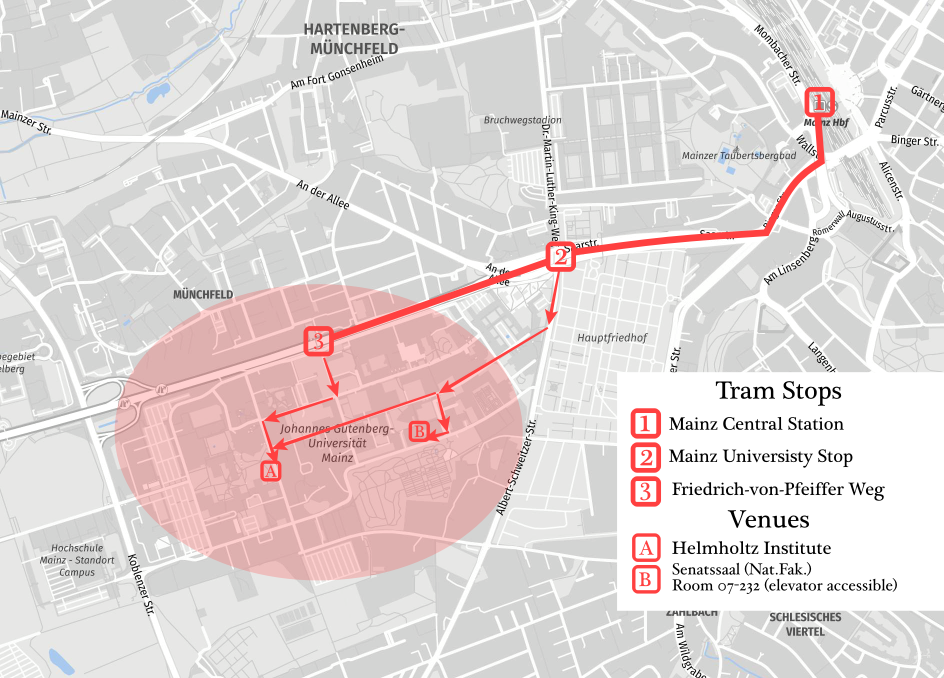
Mainz Station to City Hall (Tram lines 51, 52, and 53)
Thursday evening, we invite participants to join us for a reception at Mainz City Hall, as well as a City Hall-Lecture held by James Nagel (cf. program above). Similar to the route from Mainz Central Station to the JGU campus, there are a variety of buses and trams from Mainz Central Station to Mainz Münsterplatz (cf. (2)). We again recommend you take the tram (lines 51, 52, or 53) and then walk to City Hall (walking distance roughly 500m).
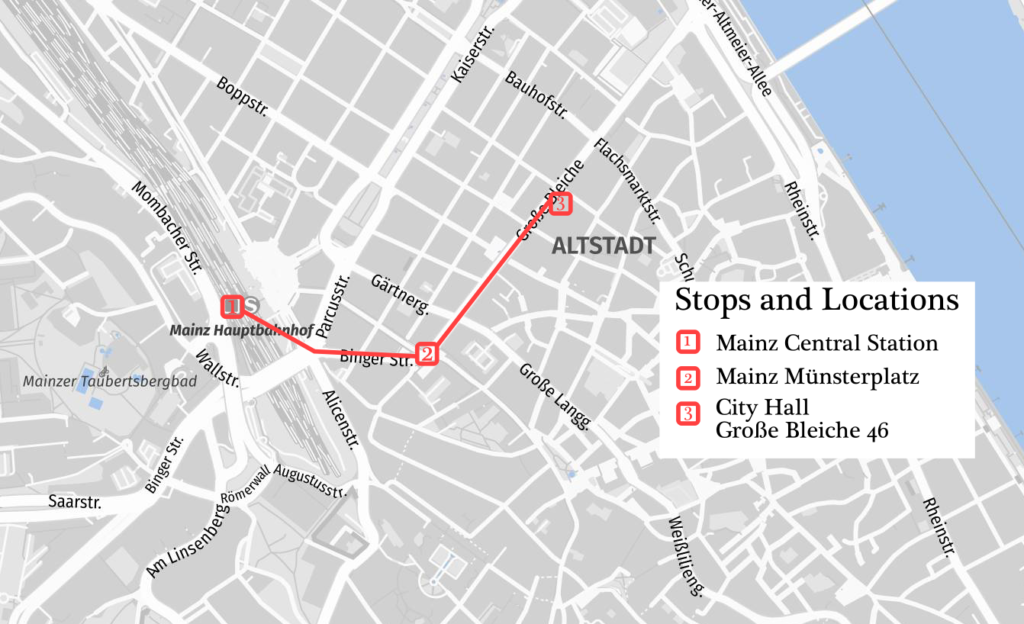
This conference is made possible by the funding of the DFG.

